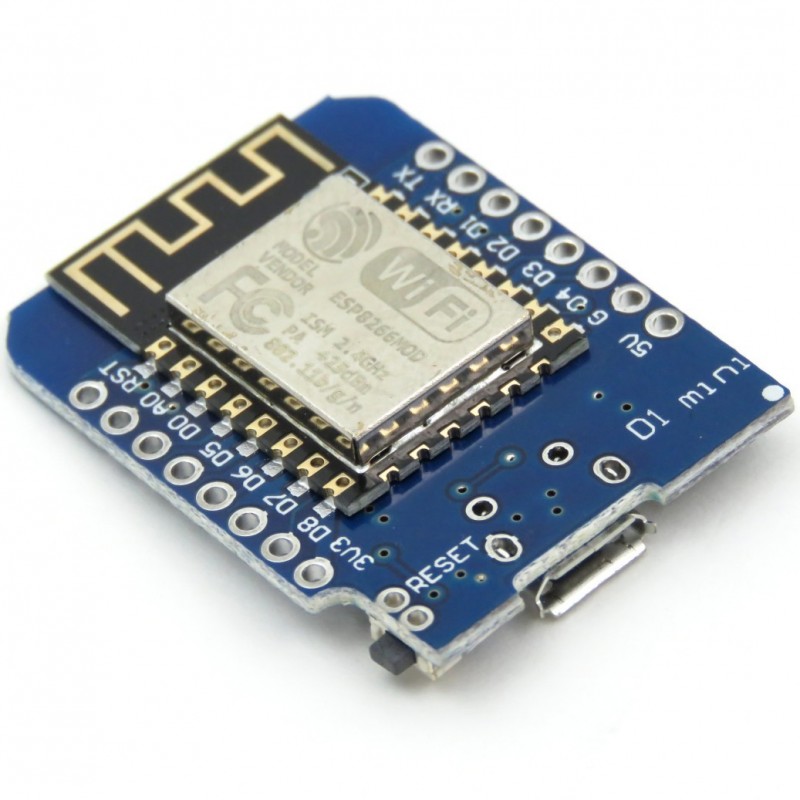

The development board allows you to integrate Wi-Fi module (ESP8266), known for its simplicity of use and considerable capabilities in projects requiring network access, eg within IoT. The module has 11 digital I / O pins with interrupt, PWM, I2C and 1-Wire. There is also one analog input (input 3.2 V max). The module is programmed through the Micro USB connector. The board is compatible with Arduino , MicroPython and NodeMCU .
Attention!
The maximum allowed voltage on the lines of the ESP8266 system is 3.3 V. Make sure that the additional module attached to the board does not force the lines of the ESP8266 voltage higher than allowed.
Data sheet
Manufacturer BTC Korporacja sp. z o. o. Lwowska 5 05-120 Legionowo Poland sprzedaz@kamami.pl 22 767 36 20
Responsible person BTC Korporacja sp. z o. o. Lwowska 5 05-120 Legionowo Poland sprzedaz@kamami.pl 22 767 36 20
WiFi module based on ESP8266. The module has a built-in antenna and USB-UART converter. The module can be programmed in Lua (under the control of the NodeMCU firmware) or in the Arduino environment. 10 GPIO lines are available which each can be configured to work as PWM, I2C.
Development board with dimensions and spacing compatible with Arduino Uno R3. It have built-in Wi-Fi ESP8266 module. The device is compatible with WeDOS D1, it can be programmed from the level of Arduino IDE
BMP180 temperature / pressure sensor module compatible with WeMos D1 mini board.
Module with 0.66 "OLED display with 64x48 resolution for D1 Mini PCB with I2C interface. WeMos OLED Shield
No product available!
Relay module for the WeMos D1 Mini WiFi set
RTC DS1307 real-time clock module and MicroSD card slot for the WeMos D1 Mini.
No product available!
E-Paper ESP8266 Driver Board is a universal driver board for e-Paper displays. The board is based on the WiFi ESP8266 module. e-Paper ESP8266 Driver Board
LoLin NodeMCU V3 is a board with ESP8266 (ESP12E). The ESP8266 system provides WiFi connectivity (802.11 b / g / n). The USB-UART converter (CH340G chip) is located on the board. The module can be programmed in Lua (under the control of the NodeMCU firmware) or in the Arduino environment. There are 10 GPIO lines available.
Development board D1 Mini with WiFi module ESP-8266MOD and 4 MB Flash memory. The module can be programmed from the Arduino IDE level. WeMos D1 Mini
BMP180 temperature / pressure sensor module compatible with WeMos D1 mini board.
Development board D1 Mini V3 with WiFi module ESP-8266 and 4 MB Flash memory. The module can be programmed from the Arduino IDE level. WeMos D1 Mini V3.x
WiFi module developed by AI-Thinker Co., Ltd with ESP8266 processor. Integrates a 32-bit MCU microcontroller with 80 MHz clock, RTOS support, Wi-Fi and antenna. The module supports the IEEE802.11 b / g / ni standard and has a complete TCP / IP protocol stack. AI-Thinker ESP-12S
Development kit with WiFi / Bluetooth module ESP8266 and 0.96 "OLED display.
Development board D1 Mini Pro with WiFi ESP8266 module and 16 MB Flash memory, equipped with ceramic antenna and external antenna connector. The module can be programmed from the Arduino IDE level. WeMos D1 Mini Pro
WiFi 802.11 b/g/n module with ESP8266 chip, there are 8 pins with UART and GPIO interface. Built-in PCB antenna. SparkFun WRL-17146
Development board with the ESP-WROOM-02 WiFi module. The board has a USB-UART converter, a basket for a Li-Ion 18650 battery and a charging circuit
A set with environmental sensors that allows you to measure air pollution and noise and visualize data on a dedicated platform. Seeed Studio 102110258
No product available!
WiFi module with ESP8266 designed to work with the Raspberry Pi Pico. It communicates via the UART interface using AT commands. Waveshare Pico-ESP8266
Adapter for ESP8266 modules dedicated to control addressable RGB LEDs from the WS2812 series
No product available!
WiFi module with ESP8266 and 1.14" display, designed to work with Raspberry Pi Pico. It communicates via UART interface using AT commands. SB Components 21888
Development board with RP2040 and ESP-12E microcontroller. Equipped with 0.91" OLED display. SB Components 24186
Module with round 1.28" IPS LCD display and 240x240 px resolution and ESP-12E chip. SB Components 24025

Development board D1 Mini with WiFi module ESP-8266MOD and 4 MB Flash memory. The module can be programmed from the Arduino IDE level. WeMos D1 Mini
